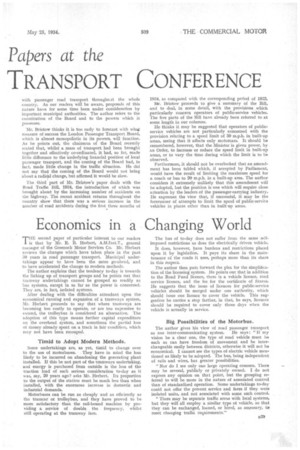Economics in a Changing World
Page 57

If you've noticed an error in this article please click here to report it so we can fix it.
THE second paper of particular interest to our readers
is that by Mr. R. B. Herbert, A.M.Inst.T., general manager of the Greenock Motor Services Co. Mr. Herbert reviews the changes which have taken place in the past. 30 years in road passenger transport. Municipal undertakings appear to• have been the more go-ahead, and to have accelerated the change to modern methods.
The author explains that the tendency to-day is towards the linking up of transport groups and he points out that tramway undertakings cannot be grouped so readily as bus systems, except in so far as the power is concerned. They are, in fact, isolated systems.
After dealing with the difficulties attendant upon theeconomical running and expansion of a tramways system, Mr. Herbert proceeds to say that where tramways are becoming too costly to operate, or are too expensive to extend, the trolleybus is considered an alternative. The adoption of this type means further capital expenditure on the overhead system, and sometimes the partial loss of money already spent on a track in fair condition, which may not have been recouped.
Timid to Adopt Modern Methods.
Some undertakings are, as yet, timid to change over to the use of motorbuses. They have in mind the loss likely to be incurred on abandoning the generating plant installed. If this be not part of the tramways undertaking, and energy is purchased from outside is the loss of the traction load of such serious consideration to-day as it was, say, 20 years ago? asks Mr. Herbert. Its proportion to the output of the station must be much less than when installed, with the enormous increase in domestic and industrial demands.
Motorbuses can be run as cheaply and as efficiently as the tramcar or trolleybus, and they have proved to be more satisfactory than the rail-bound machine by providing a service of double the frequency, whilst still operating at the tramway fare.
The bus of to-day does not suffer from the same selfimposed restrictions as does the electrically driven vehicle.
It does, however, have burdens and restrictions placed upon it by legislation. It pays its share in the maintenance of the roads it uses, perhaps more than its share in this respect.
The author then puts forward the plea for the simplification of the licensing system. He points out that in addition to the Road Fund licence, there is a vehicle licence, road service licence, and the fee for the certificate of fitness. He suggests that the issue of licences for public-service vehicles should be merged under one authority, which should issue one licence to cover the vehicle. This suggestion he carries a step farther, in that, he says, licences should be required to cover only those days when the vehicle is actually in service.
Big Possibilities of the Motorbus.
The author gives his view of road passenger transport as One inter-communicating system. He says: "If my vision be a clear one, the type of road vehicle must be such as can have freedom of movement and be interchangeable easily between districts, otherwise it will not be economical. I cannot see the types of electric vehicle mentioned as likely to be adopted. The bus, being independent of rails and wires, has greater possibilities.
"Nor do I see only one large operating concern. There may be several, publicly or privately owned. I do not express any opinion on that point, but the grouping referred to will be more in the nature of associated control than of standardized operation. Some undertakings to-day could not offer the present service and fares if they were isolated units, and not associated with some such control.
"There may be separate traffic areas with local systems, but they will all employ a similar type of vehicle, so that they can be exchanged, loaned, or hired, as necessary, to meet changing baffle requirements."




































































































